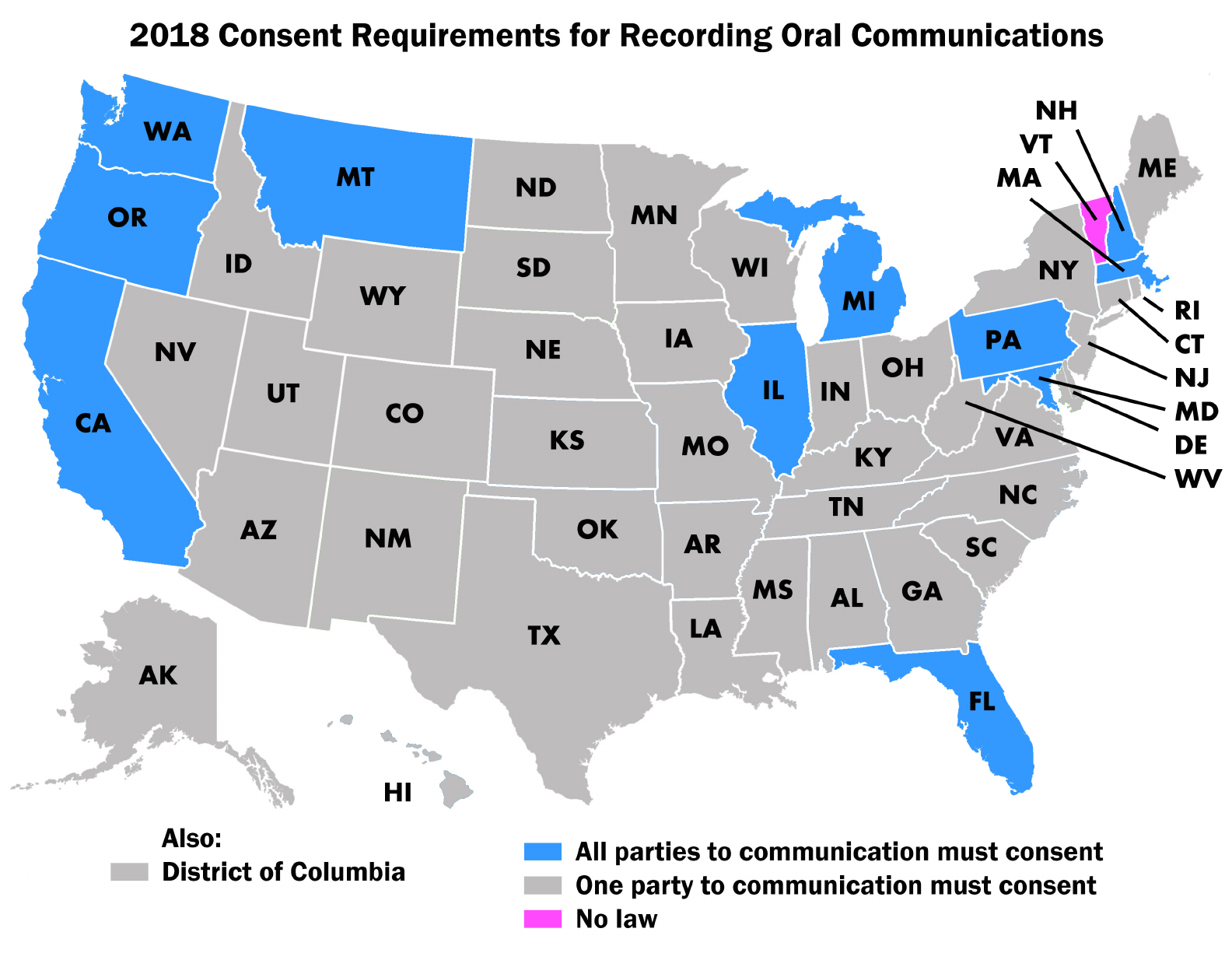
i
STATE AUDIO AND VISUAL SURVEILLANCE LAWS
Executive Summary
October 2018
Overview
Of the fifty-one jurisdictions surveyed, only Vermont has no statutory provision governing the
recording of oral conversations. All of the jurisdictions in some respect control the visual recording
of persons and/or places in specified circumstances.
The surveyed jurisdictions include the fifty states and the District of Columbia.
This survey does not include surveillance by governmental entities or in public places. It also does
not include laws relating to the use of unmanned aircraft (drones) to capture images or sound. For
more information on that topic see the Drones Annual Report (Archived) in the State Issues
Tracker.
Oral Communications
Eleven states
1
, or twenty-two percent of the fifty states that regulate the recording of oral
communications require the permission of all parties to the conversation before it can be recorded.
Three of those states recognize exceptions to their all-party consent requirement:
• Washington deems consent to be obtained whenever one party has announced to all other
parties to the conversation that it is about to be recorded and the announcement itself is
recorded.
• California’s consent requirement applies only to confidential communications and
excludes communications in any circumstance in which the parties to the communication
may reasonably expect that the communication may be overheard or recorded.
• In Oregon an in-person, oral communication may not be recorded unless all of the parties
are informed of the recording; for electronic communications, a person may record if they
either are a party to the communication or one of the parties has consented to the recording.
In those states that require the consent of only one person before a communication may be
recorded, generally the requirement is satisfied when the recording person is a party to the
communication or when one of the parties to the communication has given prior consent. Three
2
of the one-party consent states considered, but did not pass, legislation in 2018 that would have
made them all-party consent states.
1
California, Florida, Illinois, Maryland, Massachusetts, Michigan, Montana, New Hampshire, Oregon,
Pennsylvania, and Washington.
2
Oklahoma, Tennessee, and Utah.


ii
Video Recording
The vast majority of jurisdictions that criminalize nonconsensual videotaping of a person require
that the person be in an area in which that person has a reasonable expectation of privacy. Nine
states
3
make it a crime only if the videotaping is for the purpose of sexual gratification. Nineteen
states
4
, or thirty-seven percent of the surveyed jurisdictions, prohibit only nonconsensual
videotaping of the intimate parts of another person or of a nude person.
Of the seven states
5
that exempt video security surveillance systems from their prohibition on
videotaping, five
6
do so only if notice of the system is posted. Louisiana’s 2018 law governing
limited videotaping in short-term rental structures, specifies the notice language that must be used.
3
Idaho, Iowa, Louisiana, Mississippi, North Carolina, North Dakota, Oklahoma, Tennessee, and Washington.
4
Alaska, Colorado, Kansas, Kentucky, Massachusetts, Minnesota, Missouri, Nebraska, Nevada, New Jersey, New
Mexico, Ohio, Oregon, Pennsylvania, Rhode Island, Texas, Virginia, West Virginia, and Wisconsin.
5
Alaska, Arizona, District of Columbia, Florida, Georgia, Michigan, and New York.
6
Alaska, Arizona, District of Columbia, Florida, and New York.

1
STATE
1 or All
Party
Consent
Summary
Statute ‐ Communications
Statute ‐ Videos
AL
1
The consent of at least one party to a communication
is needed to record a private conversation, though,
there is no need to obtain consent to record
conversations held in public places, where there is no
reasonable expectation of privacy.
Secret observation or photography while trespassing
on private property is not allowed, however, the use of
any such recording devices positioned in areas to
which the public has access is not criminalized.
A person commits the crime of criminal eavesdropping
(to overhear, record, amplify or transmit any part of
the private communication of others without the
consent of at least one of the persons engaged in the
communication) if he intentionally uses any device to
eavesdrop, whether or not he is present at the time.
Ala. Code § 13A‐11‐31
A person commits the crime of criminal surveillance if
he intentionally engages in surveillance while
trespassing in a private place (a place where one may
reasonably expect to be safe from casual or hostile
intrusion or surveillance, but such term does not
include a place to which the public or a substantial
group of the public has access.). Ala. Code § 13A‐11‐32
AK
1
The consent of at least one party to a communication
is needed to record a conversation.
A person may not photograph or record an intimate
part of a person without the consent of that person.
A person may not use an eavesdropping device (any
device capable of being used to hear or record oral
conversation whether the conversation is conducted in
person, by telephone, or by any other means) to hear
or record all or any part of an oral conversation
without the consent of a party to the conversation.
Alaska Stat. Ann. § 42.20.310
A person may not knowingly view, or produce a picture
of, the private exposure of the genitals, anus, or
female breast of another person and the view or
production is without the knowledge or consent of the
person viewed or shown in the picture, if the person
viewed or shown is at least 13 years of age. However, it
is an affirmative defense that the viewing or
photography was conducted as a security surveillance
system, notice of the viewing or photography was
posted, and any viewing or use of pictures produced is
done only in the interest of crime prevention or
prosecution. Alaska Stat. Ann. § 11.61.123

2
AZ
1
An individual not involved in or present during a
communication must have the consent of at least one
party to record an electronic or oral communication.
Surveillance is allowed for security purposes so long as
notice is posted. Child monitoring devices (ex. baby
cam) are allowed when installed in a person's own
residence for the purpose of child supervision or safety
monitoring.
A person may not intentionally intercept (the aural or
other acquisition of the contents of any wire,
electronic or oral communication through the use of
any electronic, mechanical or other device) a
conversation or discussion at which he is not present,
or aids, authorizes, employs, procures or permits
another to so do, without the consent of a party to
such conversation or discussion. Ariz. Rev. Stat. Ann. §
13‐3005
Photographing, videotaping, filming or digitally
recording for security purposes is allowed if notice of
the use of photographing, videotaping, filming or
digital recording equipment is clearly posted in the
location and the location is one in which the person
has a reasonable expectation of privacy. Additionally,
the use of a child monitoring device (a device that is
capable of transmitting an audio or audiovisual signal
and that is installed or used in a residence for child
supervision or safety monitoring by any parent,
guardian or other responsible person in the person's
own residence) is allowed. Ariz. Rev. Stat. Ann. § 13‐
3019

3
STATE
1 or All
Party
Consent
Summary
Statute ‐ Communications
Statute ‐ Videos
AR
1
A person may record oral conversations where either
the person is a party to the conversation or at least
one of the participants has consented to the recording.
It is prohibited to secretly view or videotape a person
in any place where that person is in a private area out
of public view, has a reasonable expectation of privacy,
and has not consented to the observation.
It is unlawful for a person to intercept a wire, landline,
oral, telephonic communication, or wireless
communication, and to record or possess a recording
of the communication unless the person is a party to
the communication or one of the parties to the
communication has given prior consent to the
interception and recording. Ark. Code Ann. § 5‐60‐120
It is unlawful to use any camera, videotape, photo‐
optical, photoelectric, or any other image recording
device for the purpose of secretly observing, viewing,
photographing, filming, or videotaping a person
present in a residence, place of business, school, or
other structure, or any room or particular location
within that structure, if that person: (1) is in a private
area out of public view; (2) has a reasonable
expectation of privacy; and (3) has not consented to
the observation. Ark. Code Ann. § 5‐16‐101
CA
All
All parties to any confidential communication must
give consent to be recorded, however, any
conversations made in public places, government
proceedings, or in circumstances where the
participants of the conversation could reasonably
expect to be overheard or recorded do not require
consent.
It is prohibited to secretly visually record a person while
in any area where the person has a reasonable
expectation of privacy.
It is unlawful for a person to, intentionally and without
the consent of all parties to a confidential
communication (any communication carried on in
circumstances as may reasonably indicate that any
party to the communication desires it to be confined
to the parties thereto, but excludes a communication
made in a public gathering or in any legislative, judicial,
executive or administrative proceeding open to the
public, or in any other circumstance in which the
parties to the communication may reasonably expect
that the communication may be overheard or
recorded), by means of any electronic amplifying or
recording device, eavesdrop upon or record the
confidential communication, whether the
communication is carried on among the parties in the
presence of one another. Cal. Penal Code § 632
It is unlawful for a person to look through a hole or
opening, or otherwise view, by means of any
instrumentality, including, but not limited to, a
periscope, telescope, binoculars, camera, motion
picture camera, camcorder, or mobile phone, the
interior of a bedroom, bathroom, changing room,
fitting room, dressing room, or tanning booth, or the
interior of any other area in which the occupant has a
reasonable expectation of privacy, with the intent to
invade the privacy of a person or persons inside. Cal.
Penal Code § 647(j)

4
CO
1
The consent of at least one participant to a
conversation is required before any recording can take
place, unless such eavesdropping device is used on
one’s own premises for security or business purposes
and notice is given to the public.
The state prohibits under its privacy laws anyone from
knowingly observing or taking any visual images of
another person’s body without consent in situations
where the subject of the filming or photography has a
reasonable expectation of privacy.
Any person not visibly present during a conversation or
discussion commits eavesdropping if he knowingly
overhears or records such conversation or discussion
without the consent of at least one of the principal
parties thereto, or attempts to do so. Colo. Rev. Stat. §
18‐9‐304
This does not prevent any person from using
eavesdropping devices on his own premises for
security or business purposes if reasonable notice of
the use of such devices is given to the public. Colo.
Rev. Stat. § 18‐9‐305
A person who knowingly observes or takes a
photograph (includes a photograph, motion picture,
videotape, live feed, or other mechanically,
electronically, or digitally reproduced visual matter) of
another person's intimate parts without that person's
consent, in a situation where the person observed or
photographed has a reasonable expectation of privacy,
commits criminal invasion of privacy. Colo. Rev. Stat. §
18‐7‐801

5
STATE
1 or All
Party
Consent
Summary
Statute ‐ Communications
Statute ‐ Videos
CT
1
A person may record oral conversations where either
the person is a party to the conversation or at least
one of the participants has consented to the recording.
A person may not knowingly photograph, film or
record in any way another person’s image without
consent in situations where the person is unaware of
the filming, not in plain view and has a reasonable
expectation of privacy.
A person is guilty of eavesdropping when he unlawfully
engages in wiretapping or mechanical overhearing of a
conversation, which is the intentional overhearing or
recording of a conversation or discussion, without the
consent of at least one party thereto, by a person not
present thereat, by means of any instrument, device or
equipment. Conn. Gen. Stat. §§ 53a‐187
However, Connecticut recognizes actions for illegal
recording of private telephonic communications, in
which civil cases a person may be liable if an oral
private telephone conversation is recorded without (1)
consent from all parties prior to the conversation; (2)
verbal notification which is recorded at the beginning
of the conversation; or (3) use of an automatic tone
warning device during the recording. Conn. Gen. Stat.
§ 52-570d
A person is guilty of voyeurism when, with malice, such
person knowingly photographs, films, videotapes or
otherwise records the image of another person
without the knowledge and consent of such other
person, while such other person is not in plain view,
and under circumstances where such other person has
a reasonable expectation of privacy. Conn. Gen. Stat. §
53a‐189a
DE
1
A person may record oral conversations where either
the person is a party to the conversation or at least
one of the participants has consented to the recording.
A person may not install a camera or other recording
device in a private place, without consent of the
person(s) who are entitled to privacy there.
A person may intercept a wire, oral or electronic
communication where the person is a party to the
communication or where one of the parties to the
communication has given prior consent to the
interception, unless the communication is intercepted
for the purpose of committing any criminal or tortious
act in violation of the constitutions or laws of the
United States Delaware or any other state, or any
political subdivision thereof. Del. Code Ann. tit. 11, §
2402(c)(4)
A person may not install in any private place, without
consent of the person or persons entitled to privacy
there, any device for observing, photographing,
recording, amplifying or broadcasting sounds or events
in that place; or install or use outside a private place
any device for hearing, recording, amplifying or
broadcasting sounds originating in that
place which would not ordinarily be audible or
comprehensible outside, without the consent of the
person or persons entitled to privacy there. Del. Code
Ann. tit. 11, § 1335(2)‐(3)

6
STATE
1 or All
Party
Consent
Summary
Statute ‐ Communications
Statute ‐ Videos
D.C.
1
A person may record oral conversations where either
the person is a party to the conversation or at least
one of the participants has consented to the recording.
A person may have monitoring devices in their own
home for the purpose of security.
A person may intercept a wire or oral communication,
where such person is a party to the communication, or
where one of the parties to the communication has
given prior consent to such interception, unless such
communication is intercepted for the purpose of
committing any criminal or tortious act in violation of
the Constitution or laws of the United States, any
state, or the District of Columbia, or for the purpose of
committing any other injurious act. D.C. Code § 23‐
542(b)(3)
It is unlawful for a person to electronically record,
without the express and informed consent of the
individual being recorded, an individual who is: using
the bathroom; undressed; or engaging in sexual
activity. A person is not prohibited from security
monitoring one's own home or security monitoring in
any building where there are signs prominently
displayed informing persons that the entire premises
or designated portions of the premises are under
surveillance. D.C. Code § 22‐3531(c), (e)(2)‐ (3)

7
STATE
1 or All
Party
Consent
Summary
Statute ‐ Communications
Statute ‐ Videos
FL
All
All parties must consent to the recording and or
disclosure of the contents of any electronic, oral or wire
communication.
A person may have a video surveillance system if
written notice is clearly posted on the premises or the
presence of the device is clearly and immediately
obvious.
It is lawful for a person to intercept a wire, oral, or
electronic communication (“Oral communication”
means any oral communication uttered by a person
exhibiting an expectation that such communication is
not subject to interception under circumstances
justifying such expectation and does not mean any
public oral communication uttered at a public meeting
or any electronic communication) when all of the
parties to the communication have given prior
consent to such interception. Fla. Stat. § 934.03(2)(d)
A person may have a security system when a written
notice is conspicuously posted on the premises stating
that a video surveillance system has been installed for
the purpose of security for the premises, or have a
video surveillance device that is installed in such a
manner that the presence of the device is clearly and
immediately obvious. Fla. Stat. § 810.145(5)(b)‐(c)
GA
1
A person may record oral conversations where either
the person is a party to the conversation or at least
one of the participants has consented to the recording.
The use of a camera is prohibited without consent of
all persons observed for any events that happen in a
private place. However, a property owner may use a
recording device for security purposes to record the
activities of persons in areas where there is no
reasonable expectation of privacy.
A person may intercept a wire, oral, or electronic
communication where such person is a party to the
communication or one of the parties to the
communication has given prior consent to such
interception. Ga. Code Ann. § 16‐11‐66(a)
It is unlawful for any person, through the use of any
device, without the consent of all persons observed, to
observe, photograph, or record the activities of
another which occur in any private place and out of
public view. However, it is not unlawful for an owner
or occupier of real property to use for security
purposes, crime prevention, or crime detection any
device to observe, photograph, or record the activities
of persons who are on the property or an approach
thereto in areas where there is no reasonable
expectation of privacy. Ga. Code Ann. § 16‐11‐62(2)
HI
1
A person may record oral conversations where either
the person is a party to the conversation or at least
one of the participants has consented to the recording.
A person may not install or use a recording device in a
private place without consent of the persons entitled
to privacy therein.
It is not unlawful for a person not acting under color
of law to intercept a wire, oral, or electronic
communication when the person is a party to the
communication or when one of the parties to the
communication has given prior consent to the
interception, unless the communication is intercepted
for the purpose of committing any criminal or tortious
act that violates the Constitution or laws of the United
States or of Hawaii. Haw. Rev. Stat. § 803‐ 42(b)(3)(A)
It is unlawful to install or use outside a private place
any device for hearing, recording, amplifying, or
broadcasting sounds originating in that place which
It is unlawful to install or use, or both, in any private
place, without consent of the person or persons
entitled to privacy therein, any means or device for
observing, recording, amplifying, or broadcasting
sounds or events in that place. Haw. Rev. Stat. § 711‐
1111(d)

9
STATE
1 or All
Party
Consent
Summary
Statute ‐ Communications
Statute ‐ Videos
ID
1
A person may record oral conversations where at least
one of the participants has consented to the recording.
The use of video devices for sexual gratification on a
person who has a reasonable expectation of privacy is
not permitted without that person’s consent.
It is lawful for a person to intercept a wire, electronic
or oral communication when one of the parties to the
communication has given prior consent to such
interception. Though, it is unlawful to intercept any
communication for the purpose of committing any
criminal act. Idaho Code Ann. § 18‐6702(2)(d)‐(e)
It is unlawful, for the intent of sexual gratification, to
install or permit an imaging device at a place where a
person would have a reasonable expectation of privacy
(a place where a person might reasonably expect to be
safe from casual or hostile surveillance by an imaging
device), without the knowledge or consent of the
person using such place. Idaho Code Ann. § 18‐6609(2)
IL
All
All parties to a conversation must give consent before
one can record any part of an oral conversation.
A person may not videotape another without that
person’s consent in a restroom, tanning bed/salon,
locker room, changing room or hotel bedroom, or in
the other person’s residence.
A person may not use an eavesdropping device, in a
surreptitious manner, for the purpose of overhearing,
transmitting, or recording all or any part of any private
conversation to which he or she is not a party unless
he or she does so with the consent of all of the parties
to the private conversation. 720 Ill. Compiled Stat.
5/14‐2(a)(1). One or more of the parties must intend
the communication to be of a private nature under
circumstances reasonably justifying that expectation.
720 Ill. Compiled Stat. 5/14‐1(d)
It is unlawful for any person to knowingly make a video
record or transmit live video of another person in a
restroom, tanning bed, tanning salon, locker room,
changing room, hotel bedroom, or in that other
person's residence without that person's consent. 720
Ill. Compiled Stat. 5/26‐4(a)‐(a‐5)
IN
1
An individual has the right to record or disclose the
contents of an electronic or telephonic communication
that they are a party to or if one of the parties has
given prior consent to the recording of said
communications.
A person may not place surveillance equipment on
another person’s private property without the owner’s
or tenant’s consent.
"Interception" means the intentional recording or
acquisition of the contents of an electronic
communication by a person other than a sender or
receiver of that communication, without the consent
of the sender or receiver, by means of any instrument,
device, or equipment. Ind. Code Ann.
§ 35‐31.5‐2‐176. A person whose communications
are intercepted, disclosed, or used in violation of the
warrant requirement has a civil cause of action against
a person who intercepts, discloses, uses, or procures
another person to intercept, disclose, or use a
communication in violation of article 35-31.5 which
requires a warrant to legally intercept a
communication. Ind. Code Ann. §35-33.5-5-4
A person who knowingly or intentionally places a
camera or electronic surveillance equipment that
records images or data of any kind while unattended
on the private property of another person without the
consent of the owner or tenant commits a Class A
misdemeanor. Ind. Code Ann. § 35-46-8.5-1

10
IA
1
A person may record oral conversations where either
the person is a party to the conversation or at least
one of the participants has consented to the recording.
The use of a surveillance or monitoring system to
detect or prevent criminal activity is permissible.
A person may not secretly view, photograph or film a
person who is either fully or partially nude without
consent, so long as that subject has a reasonable
expectation of privacy.
Any person, with no right or authority to do so, who by
any electronic or mechanical means listens to, records,
or otherwise intercepts a conversation or
communication of any kind, commits a serious
misdemeanor; provided, that the sender or recipient of
a message or one who is openly present and
participating in or listening to a communication may
record such message or communication. This
prohibition also does not apply to the use of a
“monitoring system” which is defined as “a digital
video or audio streaming or recording device that
records, listens to, or otherwise intercepts video or
audio communications in order to provide proof of or
prevent criminal activity that is placed outside of a
person’s dwelling or other structure that is not in a
shared hallway and is on real property owned or
leased by the person. Iowa Code Ann. § 727.8
A person not acting under color of law may intercept a
wire, oral, or electronic communication if the person is
a party to the communication or if one of the parties
to the communication has given prior consent to the
interception, unless the communication is intercepted
for the purpose of committing a criminal or tortious
act or any other injurious act. Iowa Code Ann. §
808B.2(2)(c)
Additionally, a property owner or lessee may intercept
oral communications with a surveillance system
installed on the property with the knowledge and
consent of all owners and lessees which system is used
to detect or prevent criminal activity on the property
or in an area accessible to the general public in the
immediate vicinity of the property. Iowa Code Ann. §
808B.2(2)(d)
A person who knowingly views, photographs, or films
another person, for the purpose of arousing or
gratifying the sexual desire of any person, commits
invasion of privacy if all of the following apply: (1) the
other person does not have knowledge about and does
not consent or is unable to consent to being viewed,
photographed, or filmed; (2) the other person is in a
state of full or partial nudity; and (3) the other person
has a reasonable expectation of privacy while in a state
of full or partial nudity. Iowa Code Ann. § 709.21

11
STATE
1 or All
Party
Consent
Summary
Statute ‐ Communications
Statute ‐ Videos
KS
1
A person may not use any device to listen to, record, or
amplify a private conversation in a private place
without the consent of at least one party.
A person may not film or photograph another person
who is nude or in a state of undress without the
person’s consent in a place where the person has a
reasonable expectation of privacy.
Breach of privacy is knowingly and without lawful
authority: (1) intercepting, without the consent of the
sender or receiver, a message by telephone, telegraph,
letter or other means of private communication; or (2)
installing or using outside or inside a private place any
device for hearing, recording, amplifying or
broadcasting sounds originating in such place, which
sounds would not ordinarily be audible or
comprehensible without the use of such device,
without the consent of the person or persons entitled
to privacy therein. Kan. Stat. Ann. § 21‐6101(a)(1), (4)
"Private place" is a place where one may reasonably
expect to be safe from uninvited intrusion or
surveillance. Kan. Stat. Ann. § 21‐6101(f)
Breach of privacy is knowingly and without lawful
authority installing or using a concealed camcorder,
motion picture camera or photographic camera of any
type, to secretly videotape, film, photograph or record
by electronic or other means, another, identifiable
person under or through the clothing being worn by
that other person or another identifiable person who
is nude or in a state of undress, for the purpose of
viewing the body of, or the undergarments worn by,
that other person, without the consent or knowledge
of that other person, with the intent to invade the
privacy of that other person, under circumstances in
which the other person has a reasonable expectation
of privacy. Kan. Stat. Ann. § 21‐6101(a)(6)
KY
1
A person may not overhear or record an oral
communication without the consent of at least one
party to that communication.
A person may not use a hidden camera or any image‐
recording device to view, photograph or film a person
who is nude or performing sexual conduct without the
person’s consent in a place where the person has a
reasonable expectation of privacy.
A person is guilty of eavesdropping (to overhear,
record, amplify or transmit any part of a wire or oral
communication of others without the consent of at
least one party thereto by means of any electronic,
mechanical or other device) when he intentionally uses
any device to eavesdrop, whether or not he is present
at the time. No offense is committed if the
eavesdropping takes place with the consent of at least
one party to the communication. The offense requires
the use of some type of eavesdropping device and a
person who desires privacy of communication has the
responsibility to take the steps necessary to ensure
that his conversation cannot be overheard by the
ordinary ear. Ky. Rev. Stat. §§ 526.010, .020
A person may not use any camera, videotape, photo
optical, photoelectric, or other image recording device
for the purpose of observing, viewing, photographing,
filming, or videotaping the sexual conduct, genitals, an
undergarment worn without being publicly visible, or
nipple of the female breast of another person without
that person's consent, when the other person is in a
place where a reasonable person would believe that
his or her sexual conduct, genitals, undergarments, or
nipple of the female breast will not be observed,
viewed, photographed, filmed, or videotaped without
his or her knowledge Ky. Rev. Stat. Ann. § 531.090
LA
1
A person may record oral conversations where either
the person is a party to the conversation or at least
one of the participants has consented to the recording.
A person may not use any type of camera to observe or
record a person where that person has not consented
if the recording is for a lewd or lascivious purpose or
that person is in a place where they have a reasonable
A person not acting under color of law may intercept a
wire, electronic, or oral communication where such
person is a party to the communication or where one
of the parties to the communication has given prior
consent to such interception, unless such
communication is intercepted for the purpose of
committing any criminal or tortious act. La. Rev. Stat.
Ann. § 15:1303(c)(4)
It is prohibited to use any camera or other image
recording device for the purpose of observing,
viewing, photographing, filming, or videotaping a
person where that person has not consented to the
observing, and it is either for a lewd or lascivious
purpose or the observing occurs in a place where an
identifiable person has a reasonable expectation of
privacy. La. Rev. Stat. Ann. § 14:283(a)(1)

12
expectation of privacy.
Video surveillance is permitted in a short-term rental
structure only in common areas and only if notice of
the surveillance is posted on the premises.
An owner or lessor of a short-term rental structure
may not install or use a camera (a camcorder, motion
picture camera, photographic camera of any type, or
other equipment that is concealed or disguised to
secretly or surreptitiously videotape, film, photograph,
record, or view a person by electronic means) on the
premises of a short-term rental structure except in
common areas (all areas other than bedrooms and
bathrooms), and then only if the statutory notice of
installation of the surveillance equipment is
conspicuously posted on the premises . La. Rev. Stat.
Ann. § 21:61

13
STATE
1 or All
Party
Consent
Summary
Statute ‐ Communications
Statute ‐ Videos
ME
1
A person may not record a private conversation with
any device unless he is in the range of normal unaided
hearing, a participant in the conversation, or consent
to record was given by at least one of the parties to
the conversation.
A person may not use a recording device in a private
place without consent of the persons entitled to
privacy therein.
A person may not intentionally or knowingly intercept
(to hear, record or aid another to hear or record the
contents of any wire or oral communication through
the use of any intercepting device by any person other
than: (a) the sender or receiver of that communication;
(b) a person within the range of normal unaided
hearing or subnormal hearing corrected to not better
than normal; or (c) a person given prior authority by
the sender or receiver), attempt to intercept or
procure any other person to intercept or attempt to
intercept any wire or oral communication. Me. Rev.
Stat. Ann. tit. 15, §§ 709, 710
A person may not: (1) install or use in a private place
without the consent of the person or persons entitled
to privacy in that place, any device for observing,
photographing, recording, amplifying or broadcasting
sounds or events in that place; or (2) install or use
outside a private place without the consent of the
person or persons entitled to privacy therein, any
device for hearing, recording, amplifying or
broadcasting sounds originating in that place that
would not ordinarily be audible or comprehensible
outside that place. Me. Rev. Stat. Ann. tit. 17‐A, §
511(1)(b)‐(c)
MD
All
It is lawful to record a communication where the
person recording is a party to the communication and
all of the parties to the communication give consent.
A person may not use a camera on private property to
record or observe those inside, without consent by the
persons residing therein. Though, a person may place a
camera on private property if there is no intent to
conduct deliberate surreptitious observation of an
individual inside the private residence.
It is lawful for a person to intercept a wire, oral, or
electronic communication where the person is a party
to the communication and where all of the parties to
the communication have given prior consent to the
interception unless the communication is intercepted
for the purpose of committing any criminal or tortious
act. Md. Code Ann., Cts. & Jud. Proc. § 10‐402(c)(3)
A person may not place or procure another to place a
camera on real property where a private residence is
located to conduct deliberate surreptitious
observation of an individual inside the private
residence. This does not apply to: (1) an adult resident
of the private residence where a camera is placed; (2)
a person who places or procures another to place a
camera on real property without the intent to conduct
deliberate surreptitious observation of an individual
inside the private residence; (3) a person who has
obtained the consent of an adult resident, or the adult
resident's legal guardian, to place a camera on real
property to conduct deliberate surreptitious
observation of an individual inside the private
residence; (4) filming conducted by a person by or for
the print or broadcast media through use of a camera
that is not secreted from view; or (5) filming of a
private residence by a person through use of a camera
that is not located on the real property where the
private residence is located. Md. Code Ann., Crim.
Law § 3‐903(b), (c)

14
MA
All
All parties to a conversation must give consent before
one can record any private oral conversation.
A person may not photograph, videotape or use any
electronic device to secretly observe another person in
the nude without consent in areas where the subject
would have a reasonable expectation of privacy.
A person may not willfully commit an interception (to
secretly hear, secretly record, or aid another to
secretly hear or secretly record the contents of any
wire or oral communication through the use of any
intercepting device by any person other than a person
given prior authority by all parties to such
communication), attempt to commit an interception,
or procure any other person to commit an interception
or to attempt to commit an interception of any wire or
oral communication. Mass. Ann. Laws ch. 272, § 99(C)
A person may not willfully photograph, videotape or
electronically surveil another person who is nude or
partially nude, with the intent to secretly conduct or
hide such activity, when the other person in such place
and circumstance would have a reasonable
expectation of privacy in not being so photographed,
videotaped or electronically surveilled, and without
that person's knowledge and consent. Mass. Gen.
Laws ch. 272, § 105(b)
Note that Massachusetts courts have interpreted the
statute to permit open recording by cameras or cell
phones with an audio component when such recording
device is in plain sight.

15
STATE
1 or All
Party
Consent
Summary
Statute ‐ Communications
Statute ‐ Videos
MI
All
All parties to a conversation must give consent before
one may record any private oral conversation.
A person may not use a recording device in a private
place without consent of the persons entitled to
privacy therein. Home security monitoring devices can
be used unless for a lewd or lascivious purpose.
Any person who is present or who is not present
during a private conversation and who willfully uses
any device to eavesdrop upon the conversation
without the consent of all parties thereto, or who
knowingly aids, employs or procures another person
to do the same commits a felony. Mich. Comp. Laws §
750.539c
The Michigan statute is often interpreted as an “all
party consent” state, however, one court has
interpreted the eavesdropping statute to allow a
person in the conversation to record the same.
Sullivan v. Gray, 117 Mich. App. 476, 324 N.W.2d 58
(1982)
A person may not install, place, or use in any private
place, without the consent of the person or persons
entitled to privacy in that place, any device for
observing, recording, transmitting, photographing, or
eavesdropping upon the sounds or events in that
place. This does not prohibit home security
monitoring devices unless used for a lewd or
lascivious purpose. Mich. Comp. Laws § 750.539d
MN
1
A person may record oral conversations where either
the person is a party to the conversation or at least
one of the participants has consented to the recording.
A person may not trespass on private property to
install or use any type of device for observing or
recording sounds or events in either another person’s
home, a hotel room, tanning booth or any location
where a person would have a reasonable expectation
of privacy and either has undressed or will likely
expose their intimate parts.
Commercial property owners may use surveillance
devices as long as they post conspicuous signs warning
of such.
It is not unlawful for a person not acting under color of
law to intercept a wire, electronic, or oral
communication where such person is a party to the
communication or where one of the parties to the
communication has given prior consent to such
interception unless such communication is intercepted
for the purpose of committing any criminal or tortious
act. Minn. Stat. § 626A.02(2)(d)
A person may not enter upon another's property,
surreptitiously install or use any device for observing or
recording sounds or events through the window or any
other aperture of a dwelling of another and do so with
intent to intrude upon or interfere with the privacy of a
member of the household; or surreptitiously install or
use any device in a sleeping room in a hotel, a tanning
booth, or other place where a reasonable person
would have an expectation of privacy and has exposed
or is likely to expose their intimate parts or the clothing
covering the immediate area of the intimate parts, and
does so with intent to intrude upon or interfere with
the privacy of the occupant. This does not apply to
commercial buildings using surveillance systems when
conspicuous signs are posted. Minn. Stat. §
609.746(b)‐(c)-(f)

16
MS
1
A person may record oral conversations where either
the person is a party to the conversation or at least
one of the participants has consented to the recording.
A person may not photograph, film or produce any
images of another person with lewd, licentious or
indecent intent without that person’s consent while in
an area where there would be a reasonable
expectation of privacy.
A person not acting under color of law may intercept a
wire, oral or other communication if the person is a
party to the communication, or if one of the parties to
the communication has given prior consent to the
interception unless the communication is intercepted
for the purpose of committing any criminal or tortious
act. Miss. Code Ann. § 41‐29‐531(e)
A person may not with lewd, licentious or indecent
intent to photograph, film, videotape, record or
otherwise reproduces the image of another person
without the permission of the other person when the
other person is located in a place where a person
would intend to be in a state of undress and have a
reasonable expectation of privacy, including, but not
limited to, private dwellings or any facility, public or
private, used as a restroom, bathroom, shower room,
tanning booth, locker room, fitting room, dressing
room or bedroom. Miss. Code Ann. § 97‐29‐63(1)

17
STATE
1 or All
Party
Consent
Summary
Statute ‐ Communications
Statute ‐ Videos
MO
1
A person may record oral conversations if either the
person is a party to the conversation or at least one of
the participants has consented to the recording.
A person may not photograph or record a fully or
partially nude person in a place where the person has a
reasonable expectation of privacy and where the
person has not provided consent.
A person not acting under law may intercept a wire
communication where such person is a party to the
communication or where one of the parties to the
communication has given prior consent to such
interception unless such communication is intercepted
for the purpose of committing any criminal or tortious
act. Mo. Rev. Stat. § 542.402(2)(3)
A person may not photograph, film, videotape,
produce, or otherwise create an image of another
person, without the person's consent, while the person
is in a state of full or partial nudity and is in a place
where one would have a reasonable expectation of
privacy; or photograph, film, videotape, produce, or
otherwise create an image of another person under or
through the clothing worn by that other person for the
purpose of viewing the body of or the undergarments
worn by that other person without that person's
consent. Mo. Rev. Stat. § 565.252(1)(1)‐(2)
MT
All
A person may not record a conversation by use of a
hidden electronic or mechanical device without the
knowledge of all parties to the conversation. The
prohibition does not apply, however, to the recording
of individuals given warning of the recording.
A person may not surreptitiously photograph or record
any occupant of a home, apartment or other residence
without the occupant’s knowledge.
A person may not record or cause to be recorded a
conversation by use of a hidden electronic or
mechanical device that reproduces a human
conversation without the knowledge of all parties to
the conversation. However, this does not apply to
persons given warning of the transcription or
recording, and if one person provides the warning,
either party may record. Mont. Code Ann. § 45‐8‐
213(c)
A person commits the offense of surreptitious visual
observation or recordation in a place of residence if
the person purposely or knowingly hides, waits, or
otherwise loiters in person or by means of a remote
electronic device within or in the vicinity of a private
dwelling house, apartment, or other place of residence
for the purpose of: watching, gazing at, or looking
upon any occupant in the residence in a surreptitious
manner without the occupant's knowledge; or by
means of an electronic device, surreptitiously
observing or recording the visual image of any
occupant in the residence without the occupant's
knowledge. Mont. Code Ann. § 45‐5‐223(1)
NE
1
A person may record oral conversations where either
the person is a party to the conversation or at least
one of the participants has consented to the recording.
A person may not photograph or record the intimate
areas of another person without their knowledge or
consent where the person has a reasonable
expectation of privacy.
A person not acting under color of law may intercept a
wire, electronic, or oral communication when such
person is a party to the communication or when one of
the parties to the communication has given prior
consent to such interception unless such
communication is intercepted for the purpose of
committing any criminal or tortious act. Neb. Rev. Stat.
§ 86‐290(2)(c)
It is unlawful for any person to knowingly photograph,
film, record, or live broadcast an image of the intimate
area (the naked or undergarment‐clad genitalia, pubic
area, buttocks, or female breast of an individual) of any
other person without his or her knowledge and
consent when his or her intimate area would not be
generally visible to the public regardless of whether
such other person is located in a public or private
place. Neb. Rev. Stat. § 28‐311.08(2)

18
STATE
1 or All
Party
Consent
Summary
Statute ‐ Communications
Statute ‐ Videos
NV
1
A person may not surreptitiously record any private
conversation engaged in by other persons unless
authorized to do so by one of the parties to the
conversation.
A person may not photograph or record the private
anatomical area of another person where that person
has not consented and is in a place where they have a
reasonable expectation of privacy.
A person shall not intrude upon the privacy of other
persons by surreptitiously listening to, monitoring or
recording, or attempting to listen to, monitor or
record, by means of any mechanical, electronic or
other listening device, any private conversation
engaged in by the other persons, or disclose the
existence, content, substance, purport, effect or
meaning of any conversation so listened to, monitored
or recorded, unless authorized to do so by one of the
persons engaging in the conversation. Nev, Rev. Stat. §
200.650
The Nevada Supreme Court has held that all parties
must consent to the recording of a telephone
communication, even if the person recording is a party
to the communication. Lane v. Allstate Ins. Co., 114
Nev. 1176, 969 P.2d 938 (1998).
A person shall not knowingly and intentionally capture
an image of the private area (the naked or
undergarment clad genitals, pubic area, buttocks or
female breast of a person) of another person: without
the consent of the other person; and under
circumstances in which the other person has a
reasonable expectation of privacy. Nev. Rev. Stat. §
200.604(1)
NH
All
All parties to a conversation must give consent before
one can record any oral conversation.
A person may not use a device inside any private place
to transmit images or sounds, without consent by the
persons entitled to privacy therein. A person may not
use a device outside a private place transmitting
images or sounds originating in such place which
would not ordinarily be audible or comprehensible
outside such place, without consent by the persons
entitled to privacy therein.
A person, without the consent of all parties to the
communication, may not: (1) willfully intercept,
endeavor to intercept, or procure any other person to
intercept or endeavor to intercept, any
telecommunication or oral communication; or (2)
willfully use, endeavor to use, or procure any other
person to use or endeavor to use any electronic,
mechanical, or other device to intercept any oral
communication. N.H. Rev. Stat. Ann. § 570‐ A:2(1)
A person may not, without the consent of the persons
entitled to privacy therein, install or use: (1) in any
private place (place where one may reasonably expect
to be safe from surveillance), any device for the
purpose of observing, photographing, recording,
amplifying or broadcasting, or in any way transmitting
images or sounds in such place; or (2) outside a private
place, any device for the purpose of hearing,
recording, amplifying, broadcasting, or in any way
transmitting images or sounds originating in such place
which would not ordinarily be audible or
comprehensible outside such place. N.H. Rev. Stat.
Ann § 644:9(1)

19
NJ
1
A person may record oral conversations where either
the person is a party to the conversation or at least
one of the participants has consented to the recording.
A person may not photograph or record the intimate
parts of another person or one engaged in a sexual act
in a place where the person has a reasonable
expectation of privacy and where that person has not
given consent.
A person not acting under color of law may intercept a
wire, electronic or oral communication, where such
person is a party to the communication or one of the
parties to the communication has given prior consent
to such interception unless such communication is
intercepted or used for the purpose of committing any
criminal or tortious act. N.J. Stat. Ann. § 2A:156A‐4(d)
A person may not photograph, film, videotape, record,
or otherwise reproduce in any manner, the image of
another person whose intimate parts are exposed or
who is engaged in an act of sexual penetration or
sexual contact, without that person's consent and
under circumstances in which a reasonable person
would not expect to be observed. N.J. Stat. Ann. §
2C:14‐9(b)

20
STATE
1 or All
Party
Consent
Summary
Statute ‐ Communications
Statute ‐ Videos
NM
1
The reading, interrupting, taking or copying of any
communication is unlawful without the consent of one
of the parties to said communication.
A person may not photograph or record the intimate
areas of a nonconsenting person in a place where the
person has a reasonable expectation of privacy.
Illegal interference with communications consists of
knowingly and without lawful authority: reading,
interrupting, taking or copying any message,
communication or report intended for another by
telegraph or telephone without the consent of a
sender or intended recipient thereof. N.M. Stat. Ann. §
30‐12‐1(c)
A person may not intentionally use the unaided eye to
view or intentionally use an instrumentality to view,
photograph, videotape, film, webcast or record the
intimate areas of another person without the
knowledge and consent of that person: (1) while the
person is in the interior of a bedroom, bathroom,
changing room, fitting room, dressing room or tanning
booth or the interior of any other area in which the
person has a reasonable expectation of privacy; or (2)
under circumstances where the person has a
reasonable expectation of privacy, whether in a public
or private place. N.M. Stat. Ann. § 30‐9‐20(A)
NY
1
A person may record oral conversations where at least
one of the participants has consented to the recording.
A person may install a security system for the purpose
of security where written notice is conspicuously
posted or its presence is clearly and immediately
obvious.
A person is guilty of eavesdropping when he unlawfully
engages in wiretapping, mechanical overhearing of a
conversation (the intentional overhearing or recording
of a conversation or discussion, without the consent of
at least one party thereto, by a person not present
thereat, by means of any instrument, device or
equipment), or intercepting or accessing of an
electronic communication. N.Y. Penal Law § 250.05
A person may not, for no legitimate purpose,
intentionally use or install, or permit the utilization or
installation of an imaging device to surreptitiously
view, broadcast or record a person in a bedroom,
changing room, fitting room, restroom, toilet,
bathroom, washroom, shower or any room assigned
to guests or patrons in a motel, hotel or inn, without
such person's knowledge or consent. This does not
apply when a person installs a security system wherein
a written notice is conspicuously posted on the
premises stating that a video surveillance system has
been installed for the purpose of security, or when
video surveillance devices are installed in such a
manner that their presence is clearly and immediately
obvious. N.Y. Penal Law § 250.45, .65

21
NC
1
A person may record an oral conversation with the
consent of at least one party to the communication.
A person may not photograph or record, for the
purpose of arousing sexual desire of any person, a
nonconsenting person in a room where the person has
a reasonable expectation of privacy.
A person may not, without the consent of at least one
party to the communication, willfully intercept,
endeavor to intercept, or procure any other person to
intercept or endeavor to intercept, any wire, oral (any
oral communication uttered by a person exhibiting an
expectation that such communication is not subject to
interception under circumstances justifying such
expectation), or electronic communication. N.C. Gen.
Stat. Ann. § 15A‐287(a)(1)
A person may not, for the purpose of arousing or
gratifying the sexual desire of any person, secretly or
surreptitiously use or install in a room any device that
can be used to create a photographic image with the
intent to capture the image of another without their
consent. N.C. Gen. Stat. Ann. § 14‐202(f)

22
STATE
1 or All
Party
Consent
Summary
Statute ‐ Communications
Statute ‐ Videos
ND
1
A person may record oral conversations where either
the person is a party to the conversation or at least
one of the participants has consented to the recording.
A person may not enter another person’s property to
photograph or record sounds or events from a dwelling
with the intent to intrude upon or interfere with the
privacy of another.
A person may not intentionally intercept any wire or
oral communication by use of any electronic,
mechanical, or other device, unless the person was a
party to the communication or one of the parties to
the communication had given prior consent to such
interception, and such communication was not
intercepted for the purpose of committing a crime or
other unlawful harm. N.D. Cent. Code § 12.1‐15‐
02(1)(a), (3)(c)
An individual, with the intent to arouse, appeal to, or
gratify that individual's lust, passions, or sexual desires,
commits a crime if that individual, with intent to
intrude upon or interfere with the privacy of another,
enters upon another's property and surreptitiously
installs or uses any device for observing,
photographing, recording, amplifying, or broadcasting
sounds or events from a house or place of dwelling of
another. N.D. Cent. Code § 12.1‐20‐12.2(1)(b)
OH
1
A person may record oral conversations where either
the person is a party to the conversation or at least
one of the participants has consented to the recording.
A person may not surreptitiously videotape another
for the purpose of viewing the body/undergarments of
that person.
A person may intercept a wire, oral (must have
justifiable expectation that the communication is not
subject to interception), or electronic communication,
if the person is a party to the communication or if one
of the parties to the communication has given the
person prior consent to the interception, and if the
communication is not intercepted for the purpose of
committing a criminal offense or tortious act. Ohio
Rev. Code Ann. § 2933.52(B)(4)
No person shall secretly or surreptitiously videotape,
film, photograph, or otherwise record another person
under or through the clothing being worn by that other
person for the purpose of viewing the body of, or the
undergarments worn by, that other person. Ohio Rev.
Code Ann. § 2907.08(D)
OK
1
A person may record oral conversations where either
the person is a party to the conversation or at least
one of the participants has consented to the recording.
A person may not record, in a clandestine manner for
any illegal, illegitimate, prurient, lewd or lascivious
purpose, a nonconsenting person in a place where
there is a reasonable expectation of privacy.
A person not acting under color of law may intercept a
wire, oral or electronic communication when such
person is a party to the communication or when one of
the parties to the communication has given prior
consent to such interception unless the
communication is intercepted for the purpose of
committing any criminal act. Okla. Stat. Ann. tit. 13, §
176.4(5)
Legislation proposed in 2017 and carried over to 2018,
H.B. 2309, which would have made Oklahoma an “all
party consent” state, did not pass.
A person may not use photographic, electronic or
video equipment in a clandestine manner for any
illegal, illegitimate, prurient, lewd or lascivious purpose
with the unlawful and willful intent to view, watch,
gaze or look upon any person without the knowledge
and consent of such person when the person viewed is
in a place where there is a right to a reasonable
expectation of privacy. Okla. Stat. Ann. tit. 21, §
1171(B)

23
OR
All
A person may not record an in-person, oral
communication unless all of the participants are
informed that the conversation is being recorded. For
electronic communications, a person may record if
they either are a party to the communication or one of
the parties has consented to the recording.
A person may not photograph or record another
nonconsenting person’s intimate area in a place
where there is a reasonable expectation of privacy.
A person may not obtain or attempt to obtain the
whole or any part of a conversation by means of any
device, contrivance, machine or apparatus, whether
electrical, mechanical, manual or otherwise, if not all
participants in the conversation are specifically
informed that their conversation is being obtained. Or.
Rev. Stat. Ann. §§ 165.540(1)(c)
A person may not knowingly make or record a
photograph, motion picture, videotape or other visual
recording of another person’s intimate area without
the consent of the other person, and the person being
recorded has a reasonable expectation of privacy
concerning the intimate area. Or. Rev. Stat. Ann. §
163.700(1)(a)

24
STATE
1 or All
Party
Consent
Summary
Statute ‐ Communications
Statute ‐ Videos
PA
All
A person may not record an oral communication
unless all parties to the communication consent.
A person may not photograph or record a fully or
partially nude person in a place where the person has a
reasonable expectation of privacy and has not provided
consent.
A person may intercept a wire, electronic or oral
communication (any oral communication uttered by a
person possessing an expectation that such
communication is not subject to interception under
circumstances justifying such expectation), where all
parties to the communication have given prior consent
to such interception. 18 Pa. Cons. Stat. Ann. § 5704(4)
A person may not, for the purpose of arousing or
gratifying the sexual desire of any person, view,
photograph, videotape, electronically depict, film or
otherwise record another person without that person's
knowledge and consent while that person is in a state
of full or partial nudity and is in a place where that
person would have a reasonable expectation of
privacy. 18 Pa. Cons. Stat. Ann. § 7507.1(a)(1)
RI
1
A person may record oral conversations where either
the person is a party to the conversation or at least
one of the participants has consented to the recording.
A person may not photograph or record the intimate
areas of a person in a place where the person has a
reasonable expectation of privacy and has not
provided consent.
A person not acting under color of law may intercept a
wire, electronic, or oral communication, where the
person is a party to the communication, or one of the
parties to the communication has given prior consent
to the interception unless the communication is
intercepted for the purpose of committing any criminal
or tortious act. R.I. Gen. Laws § 11‐35‐21(c)(3)
An individual may also disclose the content of any
electronic or in-person communication that is common
knowledge or public information.
A person may not, for the purpose of sexual arousal,
gratification or stimulation, use, install or permit the
use or installation of an imaging device to capture,
record, store or transmit visual images of the intimate
areas of another person without that other person's
knowledge and consent, and under circumstances in
which that other person would have a reasonable
expectation of privacy. R.I. Gen. Laws § 11‐64‐2(1)(a)
SC
1
A person may record oral conversations where either
the person is a party to the conversation or at least
one of the participants has consented to the recording.
A person may not eavesdrop or use audio or video
equipment to spy on or invade the privacy of others;
the use of security surveillance measures in business
establishments is permissible.
It is lawful for a person not acting under color of law to
intercept a wire, oral, or electronic communication
where the person is a party to the communication or
where one of the parties to the communication has
given prior consent to the interception. S.C. Code Ann.
§ 17‐30‐30(C)
It is unlawful for a person to be an eavesdropper or a
peeping tom on or about the premises of another or to
go upon the premises of another for the purpose of
becoming an eavesdropper or a peeping tom. The term
"peeping tom", is defined as a person who peeps
through windows, doors, or other like places, on or
about the premises of another, for the purpose of
spying upon or invading the privacy of the persons
spied upon and any other conduct of a similar nature,
that tends to invade the privacy of others. The term
also includes any person who employs the use of video
or audio equipment for such.
This does not apply to security surveillance for the
purposes of decreasing or prosecuting theft,
shoplifting, or other security surveillance measures in
bona fide business establishments or any bona fide
news gathering activities. S.C. Code Ann. § 16‐17‐
470(A), (E)

25
STATE
1 or All
Party
Consent
Summary
Statute ‐ Communications
Statute ‐ Videos
SD
1
A person may record oral conversations where at least
one of the participants has consented to the recording.
A person may not use a recording device in a private
place without the consent of the persons entitled to
privacy therein.
A person, who is not present during a conversation or
discussion, may not intentionally and by means of an
eavesdropping device overhear or record the
conversation or discussion, or aid, authorize, employ,
procure, or permit another to do so, without the
consent of a party to the conversation or discussion.
S.D. Codified Laws § 23A‐35A‐20(2)
A person may not install in any private place, without
the consent of the person or persons entitled to
privacy there, any device for observing, photographing,
recording, amplifying, or broadcasting sounds or
events in such place, or use any such unauthorized
installation. S.D. Codified Laws § 22‐21‐1(2)
TN
1
A person may record oral conversations where either
the person is a party to the conversation or at least
one of the participants has consented to the recording.
A person may not photograph or record, for the
purpose of sexual arousal or gratification, a person
who has not consented when the person has a
reasonable expectation of privacy and the image would
offend or embarrass an ordinary person.
A person not acting under color of law may intercept a
wire, oral, or electronic communication, where the
person is a party to the communication or where one
of the parties to the communication has given prior
consent to the interception, unless the communication
is intercepted for the purpose of committing any
criminal or tortious act. Tenn. Code Ann. § 39‐13‐
601(b)(5)
Legislation proposed in 2018, H.B. 1528, which would
have made Tennessee an “all party consent” state did
not pass.
A person may not knowingly photograph (includes
video recording), or cause to be photographed an
individual, when the individual has a reasonable
expectation of privacy, without the prior effective
consent of the individual, if the photograph would
offend or embarrass an ordinary person if such person
appeared in the photograph and was taken for the
purpose of sexual arousal or gratification of the
defendant. Tenn. Code Ann. § 39‐ 13‐605(a)
TX
1
A person may record oral conversations where either
the person is a party to the conversation or at least
one of the participants has consented to the recording.
A person may not photograph or record an intimate
area of another person without the consent of that
person and where that person has a reasonable
expectation of privacy.
A person not acting under color of law may intercept a
wire, oral, or electronic communication, if the person
is a party to the communication or one of the parties
to the communication has given prior consent to the
interception, unless the communication is intercepted
for the purpose of committing an unlawful act. Tex.
Penal Code Ann. § 16.02(c)(4)
A person may not, with the intent to invade the
privacy of another, photograph or by videotape or
other electronic means record, broadcast, or transmit
a visual image of an intimate area of another person,
without that person’s consent, if the other person has
a reasonable expectation that the intimate area is not
subject to public view. Tex. Penal Code Ann. §
21.15(b)(1)

26
UT
1
A person may record oral conversations where either
the person is a party to the conversation or at least
one of the participants has consented to the recording.
A person may not use a recording device in a private
place without the consent of the persons entitled to
privacy therein or use a recording device outside a
private place for sounds that would not be ordinarily
audible outside.
A person not acting under color of law may intercept a
wire, electronic, or oral communication if that person
is a party to the communication or one of the parties
to the communication has given prior consent to the
interception, unless the communication is intercepted
for the purpose of committing any criminal or tortious
act. Utah Code Ann. § 77‐23a‐4(7)(b)
Legislation proposed in 2018, H.B. 330, which would
have made Utah an “all party consent” state did not
pass.
A person may not install in any private place, without
the consent of the person or persons entitled to
privacy there, any device for observing, photographing,
recording, amplifying, or broadcasting sounds or
events in the place or uses any such unauthorized
installation; or install or use outside of a private place
any device for hearing, recording, amplifying, or
broadcasting sounds originating in the place which
would not ordinarily be audible, visible, or
comprehensible outside the private place, without the
consent of the person or persons entitled to privacy
there. Utah Code Ann. § 76‐9‐ 402(1)

27
STATE
1 or All
Party
Consent
Summary
Statute ‐ Communications
Statute ‐ Videos
VT
N/A
No specific state law, but case law has held that
surreptitious electronic monitoring of communications
in a person’s home is an unlawful invasion of privacy.
A person may not secretly photograph or record a
person in a place where the person has a reasonable
expectation of privacy within a residence and has not
consented to such surveillance.
There are no specific statutes in Vermont addressing
interception of communications, but the Vermont
Supreme Court has held that surreptitious electronic
monitoring of communications in a person’s home is
an unlawful invasion of privacy. Vermont v. Geraw,
795 A.2d 1219 (Vt. 2002)
A person may not intentionally conduct surveillance or
intentionally photograph, film, or record in any format
a person without that person's knowledge and consent
while the person being surveilled, photographed,
filmed, or recorded is in a place where he or she would
have a reasonable expectation of privacy within a
home or residence. This does not apply to security or
theft prevention policies or programs at a place of
business. Vt. Stat. Ann. tit. 13, § 2605(d), (f)
VA
1
A person may record oral conversations where either
the person is a party to the conversation or at least
one of the participants has consented to the recording.
A person may not photograph or record a fully or
partially nude nonconsenting person, in a place where
the person has a reasonable expectation of privacy.
A person may intercept a wire, electronic or oral
communication, where such person is a party to the
communication or one of the parties to the
communication has given prior consent to such
interception. Va. Code Ann. § 19.2‐62(B)(2)
It is unlawful for any person to knowingly and
intentionally create any videographic or still image by
any means whatsoever of any nonconsenting person if:
(1) that person is totally nude, clad in undergarments,
or in a state of undress so as to expose the genitals,
pubic area, buttocks or female breast in a restroom,
dressing room, locker room, hotel room, motel room,
tanning bed, tanning booth, bedroom or other location;
or (2) the videographic or still image is created by
placing the lens or image-gathering component of the
recording device in a position directly beneath or
between a person's legs for the purpose of capturing
an image of the person's intimate parts or
undergarments they would not otherwise be visible to
the general public; and when the circumstances set
forth in (1) or (2) are otherwise such that the person
being recorded would have a reasonable expectation of
privacy. Va. Code Ann. § 18.2‐386.1(A)

28
STATE
1 or All
Party
Consent
Summary
Statute ‐ Communications
Statute ‐ Videos
WA
All
A person may not record a conversation unless all of
the participants give consent or are first informed that
the conversation will be recorded and such
announcement is recorded as well.
A person may not photograph or record, for the
purpose of arousing or gratifying the sexual desire of
any person, another nonconsenting person in a place
where he or she has a reasonable expectation of
privacy.
A person may not intercept or record a private
conversation, by any device, electronic or otherwise,
designed to record or transmit such conversation
regardless how the device is powered or actuated
without first obtaining the consent of all the persons
engaged in the conversation. However, consent shall
be considered obtained whenever one party has
announced to all other parties engaged in the
communication or conversation, in any reasonably
effective manner, that such communication or
conversation is about to be recorded or transmitted,
provided that if the conversation is to be recorded
that said announcement must also be recorded.
Wash. Rev. Code Ann. § 9.73.030(1)(b), (3)
A person may not, for the purpose of arousing or
gratifying the sexual desire of any person, knowingly
view, photograph, or film: another person without that
person's knowledge and consent while the person
being viewed, photographed, or filmed is in a place
where he or she would have a reasonable expectation
of privacy; or the intimate areas of another person
without that person's knowledge and consent and
under circumstances where the person has a
reasonable expectation of privacy, whether in a public
or private place. Wash. Rev. Code Ann. § 9A.44.115(2)
WV
1
A person may record oral conversations where either
the person is a party to the conversation or at least
one of the participants has consented to the recording.
A person may not secretly photograph or record a fully
or partially nude person in a place where the person
has a reasonable expectation of privacy.
A person may intercept a wire, oral or electronic
communication where the person is a party to the
communication or where one of the parties to the
communication has given prior consent to the
interception unless the communication is intercepted
for the purpose of committing any criminal or tortious
act. W. Va. Code § 62‐1D‐3(e)
It is unlawful for a person to knowingly visually portray
another person without that other person's
knowledge, while that other person is fully or partially
nude and is in a place where a reasonable person
would have an expectation of privacy. W. Va. Code §
61‐8‐28(b)
WI
1
A person may record oral conversations where either
the person is a party to the conversation or at least
one of the participants has consented to the recording.
A person may not install or use a surveillance device in
a private place to view a nude or partially nude person
without that person’s consent.
A person not acting under color of law may intercept a
wire, electronic or oral communication where the
person is a party to the communication or where one
of the parties to the communication has given prior
consent to the interception unless the communication
is intercepted for the purpose of committing any
criminal or tortious act or for the purpose of
committing any other injurious act. A person may
intercept an electronic communication where such
communication is readily accessible to the general
public. Wis. Stat. Ann. § 968.31(2)(c), (d)
Evidence obtained as the result of the use of voice
recording equipment for recording of telephone
conversations, by way of interception of a
communication or in any other manner, shall be totally
A person may not knowingly install a surveillance
device in any private place, or use a surveillance
device to observe in a private place, with the intent to
observe any nude or partially nude person without the
consent of the person observed. Wis. Stat. Ann. §
942.08(2)(a)

30
STATE
1 or All
Party
Consent
Summary
Statute ‐ Communications
Statute ‐ Videos
WY
1
A person may record oral conversations where either
the person is a party to the conversation or at least
one of the participants has consented to the recording.
A person may not photograph or record, in a
surreptitious nature, a nonconsenting person in an
enclosed place where the person has a reasonable
expectation of privacy.
A person may intercept an oral, wire or electronic
communication where the person is a party to the
communication or where one of the parties to the
communication has given prior consent to the
interception unless the communication is intercepted
for the purpose of committing any criminal or tortious
act. Wyo. Stat. Ann. § 7‐3‐702(b)(iv)
A person may not, without the consent of the person
being viewed, look in a clandestine, surreptitious,
prying or secretive nature (includes the use of a video
or imaging device) into an enclosed area where the
person being viewed has a reasonable expectation of
privacy, including, but not limited to: restrooms; baths;
showers; or dressing or fitting rooms. Wyo. Stat. Ann.
§ 6‐4‐304(a)


